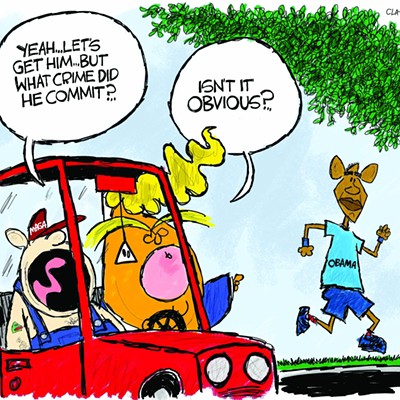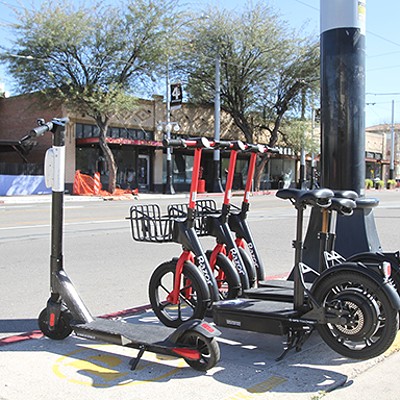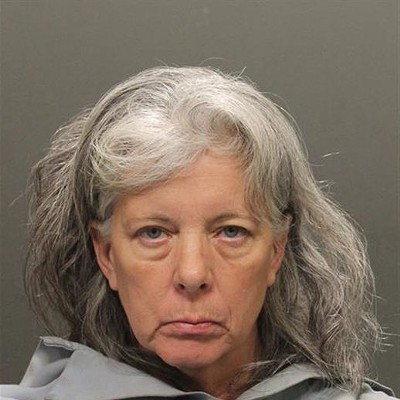The report's criticisms have been well-publicized, but I'd like to critique the report itself.
1. The panel should not have been chosen by or run by TPD. Regardless of the decent intentions and genuine contributions of many of the participants, this tainted the process from the beginning and gave it the appearance of a whitewash. TPD didn't help alter that impression when it initially tried to hold the group's meetings in secret.
2. The Tucson City Council once again abandoned both its responsibility and its authority by allowing an agency of city government whose actions were admitted by all to be questionable to define the process by which those actions were examined. Council members should not only have chosen the panel, their respective staffs should have participated in it. Ultimately, they are the "civilian review board" in a free and representative society. They are to be credited with at least making the proceedings public.
3. The panel could have been broader in make-up. More expertise in some areas would have helped, particularly from academia. It could also have met at more convenient times and at an easier-to-find location. Moving it around at the TCC lost some participants and even some media.
4. The panel's focus should have discussed the underlying philosophy of riot control and police militarization, instead of simply discussing the mistakes made in tactical deployment.
If the only thing you have is a hammer, then everything starts looking like a nail. If you train people as a paramilitary as opposed to a police force, you make everybody not a cop part of the enemy. Police militarization--seen recently in Seattle, Philadelphia, L.A. and elsewhere--is a major danger to a free society. Rowdy drunks are hardly the PLO.
5. Many called the role of the Independent Police Auditor at best ill-defined when the position was created several years ago, and considered it little more than a sop to police critics. That it at best reflects the views of the office of the City Manager to which it is attached is hardly surprising; the warnings that the position is mostly window dressing are now validated.
6. While the focus on Fourth Avenue is reasonable considering that's where the last two riots occurred, it would appear that most of the panel is concentrating on the next Fourth Avenue "event." They have basically declared Fourth Avenue the official riot site for the City of Tucson. There are rows of bars elsewhere in town, and handling a precedent as a principle is never wise.
7. The panel failed to discuss several pertinent issues or raise questions they generated. Why was the entire area from Stone to Campbell avenues between Speedway and Broadway boulevards included in the area police attempted to control? Why were many businesses on Fourth Avenue forced to close early? Why was a huge amount of police resources essentially squandered on the far periphery of the perceived problem? Why were there snipers on the roofs? Was TPD planning for a bunch of drunks or an intifada?
8. Even Mayor Bob Walkup noticed that the report spent little time discussing prevention. It ignored the option of closing the bars early. If the police have the power to close the rest of the street early on the day before the catalyst event, invade businesses, place snipers on the roofs and shoot pellets at shop owners literally minding their own businesses, cutting off the flow of booze to the drunks causing the problem would go a long way to not having a riot in the first place.
9. The constant refrain that the police need more equipment and training is an attempt by the cop bureaucracy to spin their major blunders into a bigger budget, and contradicts what they had just told MSNBC about being well trained and equipped. Certain Fourth Avenue types have followed the lead, talking about the "need" for items like a PA system they could also use for the street fair. The real solution is not a shield and baton for every cop, it's retraining that would teach them that their primary role is to protect citizens and their property, not bludgeon subjects.
TPD officers bragged in an MSNBC documentary produced this year before the riot that the 1997 incident had taught them to be ready with an all-encompassing plan. If so, that plan clearly failed at a cost now approaching a half-million dollars--and that's not including lawsuits. The principle planners should be named, replaced, fired or demoted to something they can handle. Crossing guard in Quartzsite comes to mind.
10. It was reasonable for the panel not to discuss individual misbehavior by officers, or even individual bad decisions made by police brass. But these are items that the Mayor and Council and Chief Miranda must face and that the media should pursue. Some of the actions charged, if true, border on rogue-cop hooliganism that no degree of training will cure. And some of the orders given and decisions made border on just plain stupid. In both cases the perps shouldn't get a free ride.
Whether the glass is half full or half empty depends on whether you're drinking or pouring. This glass is not completely empty. We learned from the report and the panel's efforts. The media, to the degree that they grasped the problem, followed up according to their respective interest, competency and gullibility. If nothing else, they kept the issues involved alive. Many of the panelists and participants asked bright and probing questions and we are all more aware of the problems than before, which is good.
It is now the job of the Mayor and Council to follow up on not only what the panel and public discussed, but what they didn't.












